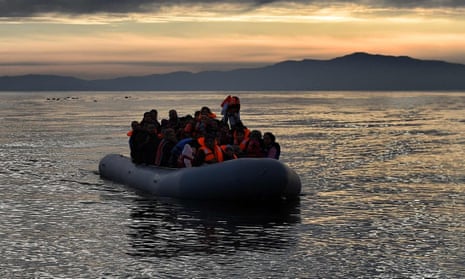Attempts to deter migrants from reaching Europe such as the EU-Turkey deal are likely to force people into the arms of smugglers, Interpol has said in a joint statement with the EU’s law enforcement agency.
More than 90% of recent irregular journeys to Europe were facilitated by smugglers, a figure that is likely to rise due to increased border protection, Interpol and Europol have concluded in a report on people smuggling.
“These numbers are expected to increase in the future in response to control measures taken by countries along the migratory routes,” the report says.
Deportations from Greece, as well as border fences in Macedonia, Hungary and Austria, are also likely to force people to try alternative smuggling routes, the report says.
“A further diversification of routes is expected as smugglers adapt their services to increased controls and find new ways into the EU,” concludes the report, which says it is based on interviews with 1,500 passengers, and investigations into 40,000 smuggling suspects. “New hotspots may emerge in response to these changes,” the report adds.
Smuggling routes to Europe in 2014 and 2015 were mainly funnelled through Turkey, Libya and to a lesser extent Egypt. Smugglers also operate inside Europe itself.
Interpol and Europol believe the one million refugees who arrived by boat last year in Europe may have provided smugglers with a turnover of as much as $5-6bn (£3.5-4.2bn), based on the assumption that migrants each pay smugglers an average of between $3,200-$6,500.
However, other researchers believe this may exaggerate the average cost of a journey, which saw many Syrians pay no more than a few hundred dollars to reach Turkey, one thousand to cross the Aegean Sea to Greece, and then several hundred to cross Europe to Germany.
The $6bn figure also does not take into account the smugglers’ costs, which include payment for boats, hotels, driving costs and bribes to officials.
The report also warns that migrants are vulnerable to sexual exploitation, in lieu of payment for smuggling services. Separately, Interpol and Europol predict that incidents such as the Paris attacks, which were partly facilitated by extremists who were smuggled into Europe, may not be isolated incidents.
“Terrorists may use migrant smugglers’ resources to achieve their goals,” the report says. “There is an increased risk that foreign terrorist fighters may use the migratory flows to (re-)enter the EU.”
Other arms of the EU argue that deterrents such as the EU-Turkey deal will bring down smuggling networks, rather than buttress them. In a statement on Monday, a spokesperson for the European commission said the EU-Turkey deal “is about breaking the business model of people smugglers, reducing the risks to vulnerable people attempting to cross a dangerous sea in unsafe vessels”.
